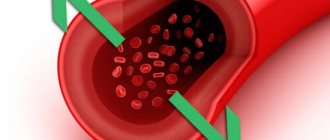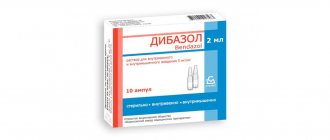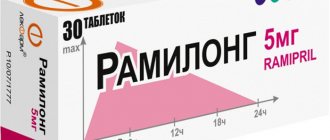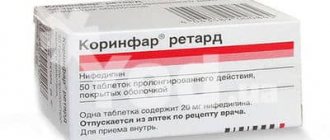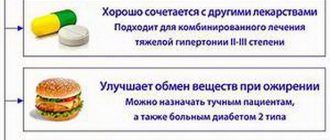Description of the drug
The drug "Captopres" refers to complex drugs that contain two active substances: captopril - an angiotensin-converting enzyme inhibitor and the diuretic hydrochlorothiazide. The drug exhibits a pronounced hypotensive and diuretic effect. It is produced in the form of tablets for oral administration by the Ukrainian pharmaceutical company.
There are two dosages of the drug, differing in the amount of the diuretic component. Captopres blood pressure tablets contain 50 mg of captopril and hydrochlorothiazide 25 or 12.5 mg. Additional components are povidone, milk sugar, aerosil, potato starch and magnesium stearate.
Composition and release form
Kaptopress is available in tablet form. There are two types of dosing of active ingredients. Depending on this, one package of the drug may contain ten or twenty tablets.
The composition of one tablet of the usual drug Kaptopress includes:
- captopril in the amount of fifty milligrams;
- hydrochlorothiazide in the amount of twenty-five milligrams;
- the remaining volume is absorbed by various excipients, including lactose.
There is also a version of the drug called Kaptopress 12.5. This version of the drug differs from the one described above in that it contains a reduced amount of hydrochlorothiazide. One tablet contains 12.5 milligrams of this active ingredient.
How the drug works
The active components determine the mechanism of action of the drug "Captopres", on which its therapeutic effect on the human body depends.
Due to the inhibition of the angiotensin-converting enzyme by captopril, the synthesis of angiotensin type 2 is suppressed. Under the influence of this oligopeptide hormone, blood vessels constrict, stimulating the production of aldosterone by the adrenal cortex.
A decrease in type 2 angiotensin reduces pressure in the arteries, in the right atrium, vessels forming the pulmonary circulation, indicators of general peripheral vascular resistance, and the load on the heart muscle. Knowing the characteristics of captopril, you can determine the effect of the drug “Captopres” and at what pressure to take this medication.
Thanks to hydrochlorothiazide, it has a moderate diuretic effect on the urinary system due to the removal of water molecules, chloride, potassium and sodium ions from the body. The substance is able to reduce the level of sodium in the vascular wall, making it less sensitive to vasoconstrictor effects, and enhance the antihypertensive effect of captopril.
Main indications
For the medicine to help, you should drink it only after measuring your blood pressure.
It is important to know when you can take Captopres tablets. Indications for use of the drug include:
- essential hypertension, which develops as a result of various factors not related to the disease;
- symptomatic hypertension, which is a symptom of various diseases;
- malignant hypertension with attacks of angina or cardiac failure;
- renovascular hypertension associated with kidney vascular problems;
- renoparenchymal hypertension in combination with chronic or acute forms of glomerulonephritis of primary and secondary etiology;
- hypertension with bronchial asthma;
- diabetic nephropathy;
- congestive heart failure, when cardiac glycosides have little effect;
- Conn's disease with the primary form of hyperaldosteronism.
The drug is used for emergency emergency treatment of hypertensive crisis.
How to take it correctly
You need to be extremely careful with Captopres tablets. At what pressure should you take the medication so as not to harm your health? This is a question many patients with hypertension ask their doctor.
Typically, normal blood pressure levels are considered to be 120/80 mmHg. Art. At higher values, it is necessary to take measures aimed at reducing blood pressure. If patients are prescribed the drug "Captopres" for blood pressure, it should be taken 60 minutes before meals so as not to interfere with the absorption of the active components. The dosage is selected depending on the form of hypertension and severity for each patient individually.
Treatment should be started with half a tablet containing captopril 25 mg and hydrochlorothiazide 12.5 mg. It is drunk once a day. For further maintenance therapy, take a whole tablet per day containing 50 mg of captopril and 25 mg of hydrochlorothiazide. The maximum therapeutic effect is observed after 1.5-2 months from the first use. Dosage adjustments are made using a 6-week interval, taking into account that there is no need for rapid changes.
Insufficient reduction in blood pressure may be a reason to include in therapy additional amounts of captopril and hydrochlorothiazide, which are taken as part of single-component drugs. The daily dose of captopril should not exceed 150 mg, and the content of hydrochlorothiazide should not exceed 50 mg.
To relieve a hypertensive crisis, I use one tablet, which is chewed and kept under the tongue.
How does the drug affect blood pressure?
The effectiveness of lowering blood pressure when taking Captopress is due to the presence of two active ingredients simultaneously in its composition. The main active ingredient is captopril. It belongs to a group of medications called ACE inhibitors.
This enzyme, like other enzymes from the above group, helps the body produce substances such as angiotensin II. Under its influence, the muscle tissue of blood vessels contracts, which reduces blood pressure.
In addition, captopress affects the formation of substances that destroy bradykinin. This mediator affects the level of vasodilation. Captopres reduces the amount of norepinephrine and endothelin in the blood, thereby lowering blood pressure.
Disorders in the urinary system
Captopril and hydrochlorothiazide are excreted via the kidneys. Disturbances in the functioning of this organ (with creatinine clearance of 30-80 ml in 1 minute) lead to an increase in the level of active components of the tablet in the blood serum.
To adjust the dose of active substances to therapeutic levels, take half a tablet per day, which corresponds to the amount of captopril 25 mg and hydrochlorothiazide 12.5 mg. Usually take the medicine in the morning 1 hour before breakfast.
Efficacy of the drug
Captopres tablets are used to treat hypertension and heart failure, and their main component captopril was first used in the 70s of the last century. Many patients talk about the benefits of the drug, that with its help blood pressure quickly decreases during a hypertensive crisis. It is important to take the pills correctly and regularly to get effective results.
Numerous clinical studies of captopril-based drugs have shown that they lower blood pressure and reduce the number of deaths from cardiovascular diseases.
Who is contraindicated for treatment?
The instructions for use for the drug "Captopres" include a number of contraindications, which include increased individual sensitivity to the active substances of the tablets, angiotensin-converting enzyme inhibitors and sulfamide derivatives.
You cannot take the drug if there is stenosis of the artery leading to a single kidney or to two kidneys, after a transplant of this organ, in case of severe disturbances in its functioning, when the rate of blood purification from creatinine is 30 ml per 1 minute, and its concentration in plasma does not exceed 1, 8 mg per 100 ml.
The medicine is not used by patients who have signs of primary hyperaldosteronism, reduced levels of potassium and sodium ions in the blood, hypovolemia, gout and hypercalcemia, obstructive changes with stenosis of the aortic mouth and impaired outflow of blood in the left ventricle. It is prohibited to take the drug during severe liver diseases, pregnant and breastfeeding women. Contraindication is children under 18 years of age.
Diuretics should be stopped 3 days before the first use of a drug based on captopril and a diuretic.
Elderly people, vehicle drivers, patients with weakened immune systems, whose creatinine clearance is 30-60 ml per 1 minute, have an increased protein content in the urine and its levels exceed 1000 mg per day, require special caution.
You need to be extremely careful when taking procainamide, heart failure, kidney disorders, diabetes mellitus, high pressure in the renal arteries. To monitor the patient's health, periodic blood pressure measurements, kidney function tests, and blood electrolyte ion levels are usually prescribed.
Description of the drug CAPTOPRES-DARNITSA
At the beginning of treatment, an excessive decrease in blood pressure may be observed, especially in patients with chronic heart failure, severe arterial hypertension (including renal origin) and/or renal failure. Before starting treatment, it is necessary to compensate for the deficiency of sodium ions and normalize the blood volume (reduce the dose of previously prescribed diuretics or, in some cases, completely cancel them), and also determine indicators of kidney function.
Regular monitoring of the concentration of potassium and calcium in the blood serum is necessary (especially in patients receiving treatment with cardiac glycosides, glucocorticoids, often using laxatives, as well as in elderly patients), glucose, uric acid, lipids (cholesterol and triglycerides), urea and creatinine, activity liver enzymes.
Regular monitoring of blood pressure and laboratory parameters is especially necessary in the following cases:
- in patients with renal failure;
- patients with severe arterial hypertension (including renal origin);
- in elderly patients (over 65 years old);
- in patients with water-electrolyte imbalance and decompensated chronic renal failure;
- as well as those receiving simultaneously allopurinol, lithium salts, procainamide and drugs that reduce immunity.
When using ACE inhibitors, a characteristic non-productive cough is observed, which ceases after discontinuation of ACE inhibitor therapy.
Some patients with kidney disease, especially those with severe renal artery stenosis, experience increases in serum urea nitrogen and creatinine concentrations after lowering blood pressure. This phenomenon is usually reversible; a decrease in the concentration of urea nitrogen and creatinine in the blood serum is observed after discontinuation of the drug containing this combination.
In some cases, during the use of ACE inhibitors, an increase in the concentration of potassium in the blood serum is observed. The risk of developing hyperkalemia when using ACE inhibitors is increased in patients with renal failure and diabetes mellitus, as well as those taking potassium-sparing diuretics, potassium supplements or other drugs that cause an increase in the concentration of potassium in the blood (for example, heparin). The simultaneous use of potassium-sparing diuretics and potassium supplements should be avoided. In addition, when using ACE inhibitors simultaneously with thiazide diuretics, the risk of hypokalemia cannot be excluded, therefore, in such cases, regular monitoring of potassium concentrations in the blood during therapy should be carried out.
When performing hemodialysis in patients receiving ACE inhibitors, the use of high-permeability dialysis membranes (for example, AN69) should be avoided, as in such cases the risk of developing anaphylactoid reactions increases. Anaphylactoid reactions have also been observed in patients undergoing LDL apheresis with dextran sulfate. The use of either a different class of antihypertensive drugs or a different type of dialysis membrane should be considered.
If angioedema develops, the drug containing this combination is discontinued and careful medical observation is carried out until the symptoms disappear completely. Angioedema of the larynx can be fatal. If the swelling is localized on the face, special treatment is usually not required (antihistamines can be prescribed to reduce the severity of symptoms); if the swelling spreads to the tongue, pharynx or larynx and there is a risk of developing airway obstruction, emergency treatment is required.
Caution should be exercised when performing desensitization in patients taking ACE inhibitors.
In patients with diabetes mellitus receiving oral hypoglycemic agents or insulin, blood glucose concentrations should be carefully monitored, especially during the first month of ACE inhibitor therapy.
ACE inhibitors are less effective in blacks than in Caucasians, which may be due to the higher prevalence of low renin activity in blacks.
During major surgery or during anesthetic therapy, patients taking ACE inhibitors may experience an excessive decrease in blood pressure. In these cases, measures are taken to increase the BCC.
In rare cases, when taking ACE inhibitors, a syndrome is observed that begins with the appearance of cholestatic jaundice, progressing to fulminant hepatonecrosis, sometimes with a fatal outcome. The mechanism of development of this syndrome is unknown. If a patient receiving ACE inhibitor therapy develops jaundice or a marked increase in liver enzymes, treatment with ACE inhibitors should be discontinued and the patient should be monitored.
Neutropenia/agranulocytosis, thrombocytopenia and anemia have been reported in patients taking ACE inhibitors. Neutropenia is rare in patients with normal renal function and no other abnormalities.
In patients with autoimmune connective tissue diseases, in patients taking immunosuppressants, allopurinol and procainamide, especially in the presence of pre-existing renal impairment. Due to the fact that the majority of fatal cases of neutropenia during the use of ACE inhibitors developed in such patients, their leukocyte count should be monitored before starting treatment, in the first 3 months - every 2 weeks, then every 2 months.
In all patients, the number of leukocytes in the blood should be monitored monthly in the first 3 months after starting therapy, then every 2 months. If the number of leukocytes is below 4000/μl, a repeat general blood test is indicated; if below 1000/μl, the drug is stopped while monitoring the patient continues. Typically, recovery in neutrophil numbers occurs within 2 weeks after discontinuation of captopril. In 13% of cases of neutropenia, death was noted. In almost all cases, fatal neutropenia was observed in patients with connective tissue diseases, renal or heart failure, while taking immunosuppressive drugs, or a combination of these factors.
When using ACE inhibitors, proteinuria may occur, mainly in patients with impaired renal function, as well as when using drugs in high doses. In most cases, proteinuria disappeared or decreased in severity after taking captopril within 6 months, regardless of whether the drug was stopped or not. Renal function tests (blood urea nitrogen and creatinine concentrations) in patients with proteinuria were almost always within normal limits. In patients with kidney disease, the concentration of protein in the urine should be determined before starting treatment and periodically throughout the course of therapy.
Sulfonamide derivatives (including hydrochlorothiazide) can cause transient myopia and acute angle-closure glaucoma, risk factors include a history of allergy to sulfonylureas or penicillin. Symptoms (sharp decrease in visual acuity, pain in the eyeball) are usually observed within a few hours to several weeks after the start of treatment. If symptoms occur, stop taking this combination immediately; If necessary, medications to correct intraocular pressure should be prescribed.
In all patients taking thiazide diuretics, clinical signs of fluid and electrolyte imbalance (hyponatremia, hypochloride alkalosis, hypokalemia) should be identified. It is especially important to determine the content of electrolytes in the blood serum and urine during excessive prolonged vomiting or during the administration of infusion solutions. Signs of water and electrolyte imbalance may include dry mouth, thirst, weakness, lethargy, confusion, anxiety, muscle pain or cramps, muscle weakness, excessive decrease in blood pressure, oliguria, tachycardia, nausea, vomiting.
Hypokalemia can provoke or enhance the cardiotoxic effect of cardiac glycosides.
The deficiency of chlorine ions is usually mild and does not require correction.
Patients with edema in hot weather may experience hyponatremia caused by an increase in blood volume. Liquid intake should be limited. In cases of life-threatening hyponatremia, sodium chloride solution is prescribed.
Hyperuricemia or gout attacks may occur during therapy with thiazide diuretics; Latent diabetes mellitus may also manifest itself.
Thiazide derivatives can cause a decrease in the concentration of bound iodine in the blood serum without signs of thyroid dysfunction.
While taking thiazide diuretics, the degree of calcium excretion decreases; There have been cases of pathological changes in the parathyroid glands, accompanied by hypercalcemia and hypophosphatemia. Before monitoring parathyroid function, the thiazide diuretic should be discontinued.
While taking thiazide diuretics, there was an increase in the degree of magnesium excretion, which can lead to hypomagnesemia.
If fever appears, swollen lymph nodes and/or signs of laryngitis and/or pharyngitis develop, the white blood cell count must be immediately determined.
The use of thiazide diuretics may cause a positive result during doping control.
Impact on the ability to drive vehicles and machinery
During the treatment period, care must be taken when driving vehicles and engaging in other potentially hazardous activities that require increased concentration and speed of psychomotor reactions.
Undesirable consequences
When taking the drug "Captopres", the instructions describe the occurrence in some patients of various adverse reactions that affect different systems of the body.
With a negative effect on the digestive tract and liver, appetite decreases, the oral mucosa becomes dry, nausea, vomiting, pain in the stomach, irregular bowel movements, the development of stomatitis, peptic ulcers, jaundice, hepatitis, and increased bilirubin in the blood can be observed.
The effect on the heart, blood vessels and hematopoietic organs can be manifested by tachycardia, angina pectoris, low blood pressure, Raynaud's syndrome, redness or pallor of the skin, cardiogenic shock, neutropenia, agranulocytosis, thrombocytopenia, pancytopenia, hemolytic or aplastic anemia.
The drug has an effect on the central nervous system that disrupts sleep patterns, vision and taste, cerebral circulation, causes headaches, attacks of dizziness, emotional lability, confusion, and numbness of the extremities.
The effect on the respiratory system is manifested by cough, respiratory dysfunction, bronchospasm, and allergic rhinitis.
Side effects on the urinary system include renal failure, polyuria, oliguria, and nephrotic syndrome.
Allergies may develop in the form of skin rash, itching, urticaria, Quincke's edema, Stevens-Johnson syndrome, photosensitivity, erythema.
Features of treatment
For many patients, it is important to know how the drug Captopres works and at what pressure to take it. Usually the medicine is taken when blood pressure rises, which is not correct. You need to take the medication systematically as recommended by your doctor.
During treatment, you should check the electrolyte concentration, especially potassium ions, the amount of creatinine and urea and monitor peripheral blood counts.
While taking the drug, you need to consume foods with minimal sodium content; alcohol is contraindicated.
Having a diuretic effect, the medicine can aggravate the state of impaired water-electrolyte balance associated with diuretic therapy, diarrhea, vomiting, a low-sodium diet, hemodialysis, resulting in arterial hypotension. Before antihypertensive therapy, electrolyte levels in the body should be adjusted.
Patients with impaired cardiac activity and the elderly are prescribed Captopres tablets with caution. At what pressure should I take the drug so that its readings do not become too low? Before taking the medication, you should check your blood pressure, it is also necessary to monitor your kidney function and the content of vital ions.
The Negroid race is considered resistant to the effects of drugs that inhibit angiotensin-converting enzyme, which is why captopril has less effect in such patients.
Contraindications and side effects
People suffering from the following symptoms and conditions should not take Captopress:
- Individual intolerance to the active ingredients of the drug;
- hypersensitivity to the substance captopril;
- increased sensitivity to diuretics;
- hypercalcemia;
- various diseases associated with impaired immunity;
- disturbance of water and electrolyte balance in the body;
- gout.
Treatment with captopress is comparable in the occurrence of many side effects. The most common ones are listed below:
- a sharp drop in blood pressure, accompanied by an irregular heartbeat;
- dry cough;
- runny nose;
- digestive disorders - nausea, changes in stool;
- dry mouth;
- Various allergic reactions to substances contained in the drug.
Advantages of Captopres tablets
- Captopril-based drugs reduce mortality rates in diseases of the cardiovascular system.
- Captopres tablets can reduce high blood pressure. They can be used in old and senile age.
- When treated with the drug, kidney damage, including diabetic nephropathy and cancer, is reduced.
- Does not reduce libido in males, can exhibit antioxidant activity.
- A course of treatment with Captopres tablets will cost less than taking other modern medications that lower blood pressure.
Interaction with other drugs
Kaptopress is prescribed for treatment in combination with other auxiliary agents, which will differently affect the effect of taking the drug. The use of Captopress is affected by:
- a group of diuretics and adrenergic blockers - increases the degree of hypotensive effect;
- non-steroidal anti-inflammatory drugs - reduce the effect of taking Captopress;
- drugs containing ethyl alcohol and narcotic substances lead to orthostatic hypotension;
- potassium-based drugs - simultaneous use leads to hyperkalemia.
Moreover, the effect of Captopress changes when taking other medications:
- Anesthetics - there is an increase in effect;
- drugs intended for the treatment of diabetes mellitus - reduces effectiveness;
- drugs from the group of cardiac glycosides - increase the degree of intoxication in the body.
